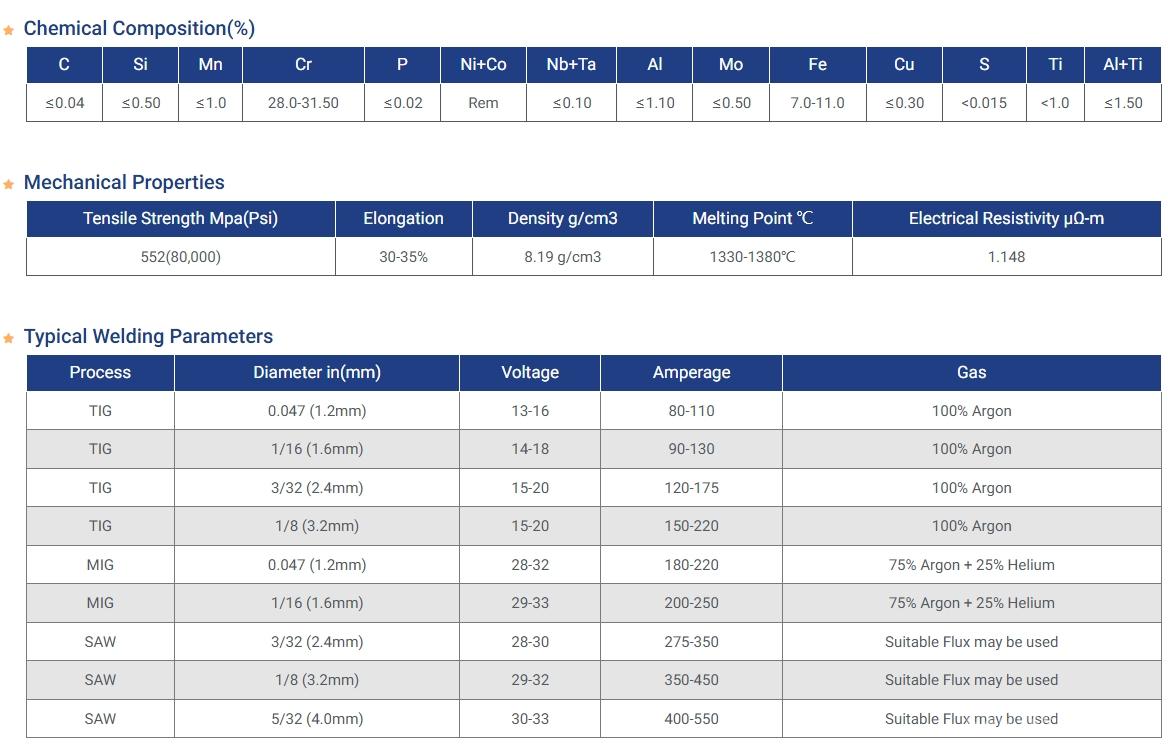Welcome to Jiangsu DZX Metal Co., Ltd.
Email:sales8@dlx-alloy.com Mobile/Whatsapp:+86 199 0611 9641
Professional manufacturer of welding wires and spraying wires,over 20 years.
Whatsapp:+8619906119641
Email:sales8@dlx-alloy.com
Add:NO.32 West Taihu Road, Xinbei District, Changzhou, Jiangsu,China
Nickel Based Welding Wire
High Quality Low-hydrogen Flux Welding Rod ERNiCrFe-7 TIG 1.6*1000mm
Product Details
Product Information
ERNiCrFe-7 is a nickel-chromium-iron alloy welding rod designed for Tungsten Inert Gas (TIG) and Metal Inert Gas (MIG) welding applications. It is primarily used for welding Inconel 600, Incoloy 800, and other high-temperature and high-strength nickel-based alloys. The alloy provides excellent resistance to oxidation, corrosion, and thermal fatigue. It is widely used in industries such as power generation, aerospace, chemical processing, and marine applications.
Other Names:
Nickel-Chromium-Iron Covered Electrode
AWS A5.14 ERNiCrFe-7
UNS W86111 Electrode
Material Composition:
Nickel (Ni): ≥ 58%
Chromium (Cr): 14–17%
Iron (Fe): Balance (Approx. 18–20%)
Manganese (Mn): ≤ 1.0%
Silicon (Si): ≤ 0.5%
Carbon (C): ≤ 0.08%
Phosphorus (P): ≤ 0.02%
Sulfur (S): ≤ 0.02%
Appearance / Color:
The welding rod features a solid metallic core with a light gray to tan flux coating, designed for low-hydrogen output.
Core Wire Diameter:
Available in 2.4 mm, 3.2 mm, 4.0 mm, and 5.0 mm (custom sizes available upon request).
Flux Coating:
The flux coating accounts for 30–35% by weight and is designed for low-hydrogen output, ensuring smooth welds with minimal spatter.
Packaging:
Supplied in 5 kg sealed boxes, providing safe storage and easy handling.
Characteristics
Corrosion Resistance: ERNiCrFe-7 offers exceptional resistance to both oxidizing and reducing environments, which is critical in industrial applications involving exposure to harsh chemicals.
High-Temperature Strength: The alloy exhibits outstanding strength and durability even at elevated temperatures, making it ideal for high-stress, high-heat environments like gas turbines and heat exchangers.
Weldability: Provides excellent weldability with low spatter and smooth weld beads. The low-hydrogen flux reduces the risk of cracks and ensures strong welds.
Ductility and Toughness: The rod is highly ductile, meaning it retains its integrity and toughness under both static and dynamic loading conditions.
Thermal Cycling Resistance: ERNiCrFe-7 is particularly resistant to thermal cycling, making it suitable for environments where temperature fluctuations are common.
Technology
ERNiCrFe-7 is formulated for TIG and MIG welding, utilizing both non-consumable tungsten electrodes in TIG welding and continuous wire feeding in MIG welding. The alloy’s composition ensures high performance in terms of strength, corrosion resistance, and oxidation resistance.
Tungsten Inert Gas (TIG) Welding: In TIG welding, the ERNiCrFe-7 rod is melted by the heat of the arc and fused with the base material. It produces highly precise and clean welds with minimal heat-affected zones, making it ideal for thin materials.
Metal Inert Gas (MIG) Welding: In MIG welding, ERNiCrFe-7 is used as a continuous feed electrode, offering high-speed welding and strong, clean welds. This method is especially efficient for welding thicker materials or in high-throughput production environments.
Theory
In the welding process, ERNiCrFe-7 is melted to form a molten weld pool that fuses with the base material. The chromium content provides oxidation resistance, while the nickel enhances the weld’s overall strength and ductility. The iron content adds toughness, and the flux coating ensures smooth welding without hydrogen-induced cracking.
The low-hydrogen flux ensures that the weld remains strong, crack-free, and resistant to moisture, even in challenging environments. The alloy’s resistance to thermal cycling also ensures the longevity of the weld, even under repeated temperature fluctuations.
Application / Usage
ERNiCrFe-7 is designed for use in environments that require excellent resistance to oxidation, corrosion, and high-temperature exposure. Its applications include:
Power Generation:
Welding parts exposed to extreme heat, such as gas turbines, boilers, and superheaters in power plants.
Aerospace:
Welding components of jet engines, such as turbine blades, combustion chambers, and other high-temperature, high-stress components.
Chemical Processing:
Ideal for welding reactors, heat exchangers, and pipelines used in acidic or highly corrosive environments.
Marine Applications:
Used for welding components exposed to saltwater, such as marine engines and offshore structures.
Heat Exchanger Manufacturing:
ERNiCrFe-7 is widely used for the welding of heat exchangers in industries where corrosion resistance and high-temperature strength are required.
Advantages / Selling Points
Excellent Corrosion Resistance: Resistant to oxidizing and reducing environments, particularly in chemical processing and marine applications.
High-Temperature Durability: Performs well at high temperatures, making it suitable for applications in power generation and aerospace industries.
Low Hydrogen Flux Coating: The low-hydrogen flux ensures smooth welds, reduces spatter, and minimizes the risk of cracks.
Weldability: Offers excellent weldability with low spatter and easy arc striking, making it user-friendly in both TIG and MIG welding processes.
Thermal Cycling Resistance: Withstands repeated thermal cycling, making it ideal for high-performance applications where temperature fluctuations are common.
Parameters Table / Selection Table
| Parameter | Details |
|---|---|
| Material Composition | Ni ≥ 58%, Cr 14–17%, Fe Balance |
| Electrode Diameter | 2.4 mm, 3.2 mm, 4.0 mm, 5.0 mm |
| Shielding Gas | Argon (for TIG), Argon + CO2 (for MIG) |
| Tensile Strength | 75,000 psi (minimum) |
| Melting Point | ~1,350°C (2,462°F) |

FAQ:
What is your working time?
Oct.1-7 and Chinese New Year holiday . Pls email us during our holiday if u have any question.
T/T,L/C,D/A,D/P,Western Union,MoneyGram,Paypal

